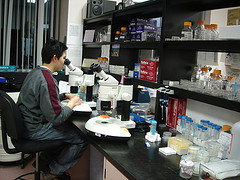Too often, I fail to acknowledge how lucky I am to know everything I do. I have access to resources that even 50 years ago weren’t readily available in local libraries let alone in the comfort of my home via computer. Beyond easy access, there’s the sheer volume of knowledge that’s accumulated over the years. With every passing year, we learn something about the world and about the people who inhabit it. However, I’ve noticed a worrisome trend in the way we’re gaining our knowledge—we’re doing it secondhand.
From Knowledge Comes Beliefs
Using the things we learn we form opinions and ideas that support a certain line of thought. Sometimes these opinions and ideas harden into beliefs that stick with us for years. Over time, I’ve come to realize that few of us extend the effort to go to the source, but rather listen to others who have.
I’ve defined the source as Authorities. These individuals include scientists and others who ask a particular question and then pursue activities in an effort to answer said question. Then, there are the Filters. These individuals include politicians, pundits, activists, and the like who analyze ideas generated by the Authorities and promote them to like-minded constituencies.
A significant portion of our knowledge comes from these two categories. It makes sense that we seek after the knowledge of people with the experience versus repeating everything ourselves. This reliance places us in a position of trusting that what we’re hearing is a truth, at least of sorts.
Too Much Faith
In recent years, I believe we’ve become far too reliant on the interpretation of knowledge promoted by Filters and ignored the original source to our detriment. I see this reliance in multiple public discussions where either side is equally vehement in its defense of a particular position:
- Global Warming
- Abortion
- Big vs. Small Government
- Foreign Policy
The list could go on for pages, but I suspect that within an instant you could easily call up multiple ideas and opinions related to these debates, both in support of your position and against it.
Now that you’re thinking of the reasons why you believe what you do, where did your knowledge come from? Perhaps I assume to much, but I hypothesize that much of what we know comes through Filters.
Authorities Require Extra Effort
Going to Authorities for our knowledge is a challenge. Sometimes the answers we’re seeking are buried under statistics and confusing prose that make our eyes feel heavy. Sometimes the obscurity of an Authority makes it difficult to return to the original work, particularly if a much easier book written by a Filter sits on the shelf or holds forth on the television. But we often miss something when we seek our knowledge via Filters—the original purpose of the Authority.
Filters Have Their Own Purpose
Filters have their own goals to fulfill, and whether those goals align with the original intent of the Authority can be secondary. Often, in order to answer a question, an Authority seeks to understand an opposing viewpoint to the answer pursued. The same does not happen as often with Filters. We’re left to weigh for ourselves the intent behind the knowledge the Filter chooses to put forth, sometimes with mixed results.
Debating with Filtered Knowledge
Consider our current circumstances. For many of us, what we know about the stimulus package being tossed around in Congress is based on what we’ve heard on the news or read online. (Note: If you’ve read the full bill, I’d love to hear your take on the situation.) We hear about Republicans fighting with Democrats, President Obama chastising reluctant politicians, and ominous declarations of what will happen if Congress fails to act. We hear very little about the actual details of the package itself, unless they’re controversial, like Representative Waxman’s addition of contraceptive funding. Why is that?
We’re talking about spending $800+ billion (that’s EIGHT zeros). It feels like we’ve abdicated our right to go to the source and instead rely on the Filters for what comes next. The same things has happened with multiple public debates. I’m not advocating that we swear off using Filters, but I do wonder what our world would look like if we were a little less reliant on them.
Filters make it easy to block out opposing viewpoints, putting us at individual risk. Sun Tzu said,
“If you know the enemy and know yourself, you need not fear the result of a hundred battles. If you know yourself but not the enemy, for every victory gained you will also suffer a defeat. If you know neither the enemy nor yourself, you will succumb in every battle.”
In our pursuit of evermore knowledge we owe it to ourselves to return to the source, to wade through the difficult, to challenge the interpretation presented by the Filters. Otherwise, we risk knowing neither ourselves nor our enemies.




What’s That You Say?